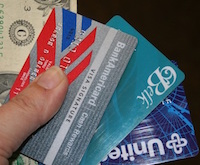According to the Federal Trade Commission, an estimated 9 million people will become victims of identity theft this year, and 31 percent of those people will be children, teenagers or young adults.
Identity thieves target young people because of their unblemished credit histories and because the theft often goes undetected for months if not years. Teenagers and children will likely have no indication that their identities have been stolen because they have no credit or any reason to check their credit report.
More teens are seeing their identities stolen because they’re spending more of their lives online and they have so much personal information on their cell phones.
What is identity theft?
The definition of identity theft is when an unauthorized person uses someone’s personal information to start new credit accounts, commit crimes in another person's name, get loans or even land a job. Other types of identity related crimes include the use of an existing credit card or bank account.
Thieves can obtain personal information by going through your trash, watching you use your computer or phone in a public place, stealing mail or stealing a cell phone.
Victims often find their identity has been stolen after their credit has been affected. In some cases people have been denied loans or even jobs because the identity theft has wrecked their credit.
While the financial losses can be great, the emotional toll can be just as bad. Victims are often left feeling powerless, angry, hopeless, frustrated and have a hard time trusting other people.
Young adults are especially susceptible because teens with unused social security numbers have no credit rating. A teen’s good credit usually sits unused until he or she is old enough to obtain a credit card. A criminal can steal the teen’s social security number, impersonate the teen and then use the number to obtain credit cards and loans, which they do not pay back.
What you can do?
Teach your children to be stingy with personal information.
The rules for keeping teens’ identities safe are the same for keeping adults' safe. Parents should talk to their children about how serious identity theft is so teens are more careful with their information.
They should never carry their social security card on them. Instruct them to never to give out their social security number or their mother’s maiden name. They should never give out personal information over the telephone unless they initiate the call. Also be sure to shred all sensitive or financial records before throwing them away.
Remind them that they should never respond to e-mails requesting personal or financial information. Teach teens to choose strong passwords and change them often. Install a firewall on home computers and remind family members to keep all software programs updated.
Teens should be warned to not post identifying information about you or your family on social media pages or other places online and not to use the “save password” function on important accounts.
Lastly, check your child's credit at least once a year or place a preventative freeze on their credit.
Most teens and children do not have credit reports to check until they, or someone posing as them, begin their financial lives. If the child or teen does have a credit report, than it is advisable to freeze their credit until they are 18, said Shawn Conroy of the Governor’s Office of Consumer Protection.
By following these tips, you can insure your family's credit will remain in the best possible standing and prevent unwanted stress in the future.
For more information about preventing identity theft and Georgia’s laws concerning freezing credit, visit p>For more information about preventing identity theft and Georgia’s laws concerning freezing credit, visit consumer.georgia.gov.








